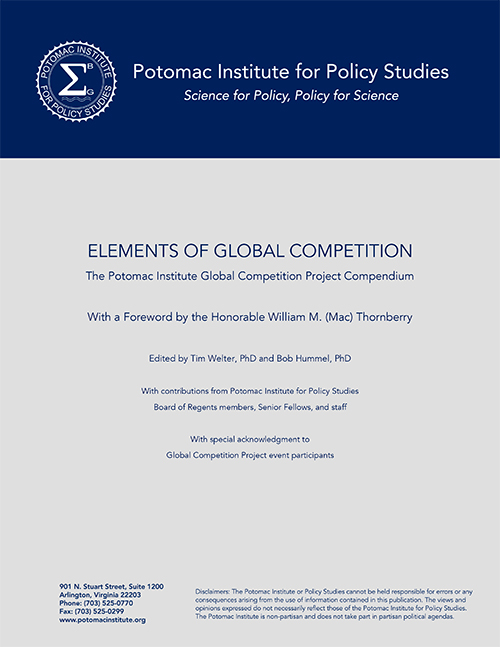Featured
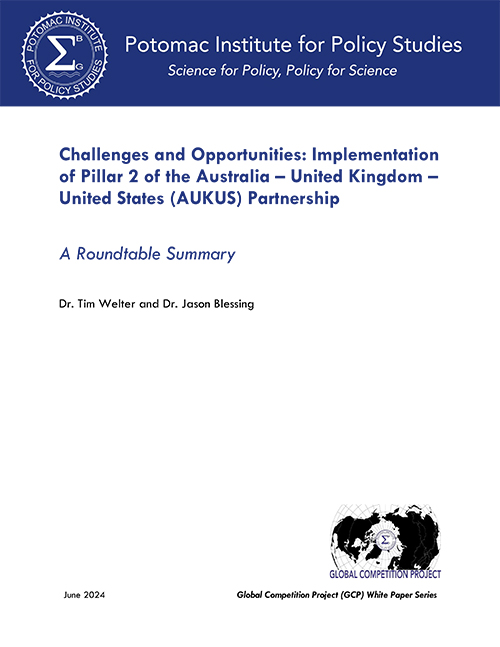
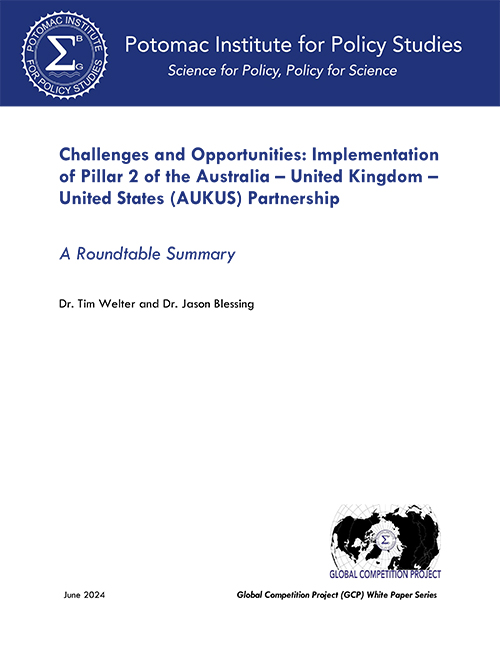 The Australia – United Kingdom – United States (AUKUS) security partnership, announced on September 15, 2021, was a watershed moment for competition with China in the Indo-Pacific region. Intended to “promote a free and open Indo-Pacific that is secure and stable,”1 the trilateral initiative consists of two lines of effort. Pillar 1 of the agreement, which hinges on the US and UK sharing nuclear propulsion technology and the delivery of nuclear-powered submarines to Australia, has received the lion’s share of attention.2 Pillar 2, focused on the joint development of advanced technological capabilities, arguably has far greater potential for economic and security impact and cooperation among the AUKUS partners.
The Australia – United Kingdom – United States (AUKUS) security partnership, announced on September 15, 2021, was a watershed moment for competition with China in the Indo-Pacific region. Intended to “promote a free and open Indo-Pacific that is secure and stable,”1 the trilateral initiative consists of two lines of effort. Pillar 1 of the agreement, which hinges on the US and UK sharing nuclear propulsion technology and the delivery of nuclear-powered submarines to Australia, has received the lion’s share of attention.2 Pillar 2, focused on the joint development of advanced technological capabilities, arguably has far greater potential for economic and security impact and cooperation among the AUKUS partners.
On May 9, 2024, the Potomac Institute for Policy Studies in collaboration with 401 Tech Bridge hosted a closed-door roundtable on the partnership. The purpose of this roundtable was to identify the key challenges and opportunities associated with the co-development of advanced capabilities under Pillar 2 of AUKUS. The event convened experts from government, industry, and academia across the three countries to discuss implementation and lay a foundation for action.


In Memoriam
Professor Yonah Alexander
Professor Yonah Alexander passed away peacefully at the age of 93. His family will organize a celebration of life at a future date.
Professor Alexander served as a Member of the Board of Regents, Senior Fellow, and Director of the International Center for Terrorism Studies at the Potomac Institute for Policy Studies. His affiliation with the Potomac Institute spanned twenty-five years, with prescient work alongside Michael Swetnam, Gen. (Ret.) Alfred Gray, Brig. Gen. (Ret.) David Reist, and many other distinguished professionals in the United States and abroad. Professor Alexander’s contributions to the Potomac Institute included publishing books and reports (which can be found here), holding in-person and Zoom-based seminars, obtaining external funding, raising its domestic and international media profile (including 63 video appearances on C-SPAN), hosting hundreds of interns, providing guidance on combating terrorism to the public and private sectors, and serving as a dedicated colleague. As a devoted scholar and teacher, his primary mission included inspiring the next generation to recognize historical patterns, thereby minimizing the risk of future conflict. He cherished his long association with the Potomac Institute and viewed it as an honor and privilege to partner with such an eminent institution.
Professor Alexander was a pioneer in an uncharted field. He worked on the forefront of terrorism studies, publishing innovative research, lecturing, writing, and analyzing global terrorism. Professor Alexander served for over 40 years at universities in the United States and abroad. Among his more than 100 published books on global security and counterterrorism, he authored seminal works on al-Qaida and documented the evolution of U.S. and international terrorism policy. He founded five academic journals, including: Terrorism, Minorities and Group Rights, Political Communication and Persuasion, NATO’s Partnership for Peace Review, and Terrorism: An Electronic Journal & Knowledge Base. Professor Alexander’s publications have been translated into many languages. He lectured in dozens of countries and appeared extensively in international media. Professor Alexander’s personal papers and terrorism collection are housed at the Hoover Institution Library and Archives at Stanford University.
Professor Alexander studied under numerous distinguished academics. He earned his Bachelor’s degree in Political Science from Roosevelt University, a Master’s degree in International Relations from the University of Chicago, and a PhD in Public Law and Government from Columbia University. He cited Dr. Edward Teller, one of the early members of the Manhattan Project, as a catalyst for his academic work in terrorism studies.
Professor Alexander listed Professor Hans Morgenthau and Justice Phillip Jessup as mentors and inspirations for his work. During his long career, he was also guided by and collaborated with Henry Kissinger, Justice Arthur Goldberg, Al Gore, Wesley Clark, William Webster, Clarence Kelley, Robert Mueller, Madeleine Albright, Joseph Lieberman, Thomas Ridge, Stuart Eizenstat, and Abraham Sofaer.
By recording and learning from history, Professor Alexander’s research forewarned trends in terrorism. Upon reflecting on his life’s work, Professor Alexander noted, “We have to follow the lessons history teaches us in order to allow for international diplomacy, to continue to have patience, to listen, and to make sure we avoid violent situations.”
Professor Alexander endeavored to bridge communication gaps between societal sectors. He sought to increase cooperation among government, industry, non-profits, non-governmental organizations, and individuals.
From the inception of his interest in terrorism studies, Professor Alexander strived to define the cyclical nature of violence and how societies can achieve peace with justice. He proffered, “The key question, then, is whether civilization will survive? And my short answer is yes — if we want to learn from the lessons of history.”
Professor Alexander’s final work, NATO: Past Lessons and Strategic Mission for the 21st Century, will be published in May 2024.
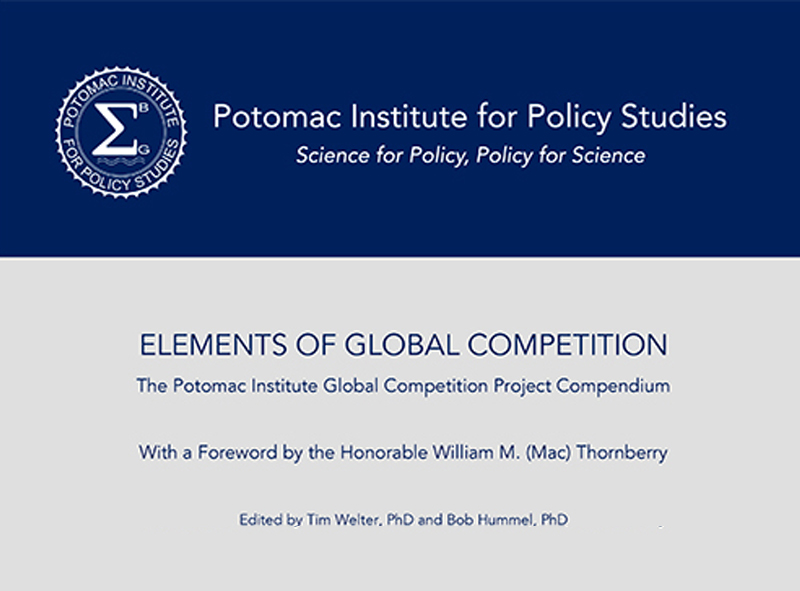
ELEMENTS OF GLOBAL COMPETITION The Potomac Institute Global Competition Project Compendium
With a Foreword by the Honorable William M. (Mac) Thornberry
Edited by Tim Welter, PhD and Bob Hummel, PhD
With contributions from Potomac Institute for Policy Studies Board of Regents members, Senior Fellows, and staff
With special acknowledgment to Global Competition Project event participants
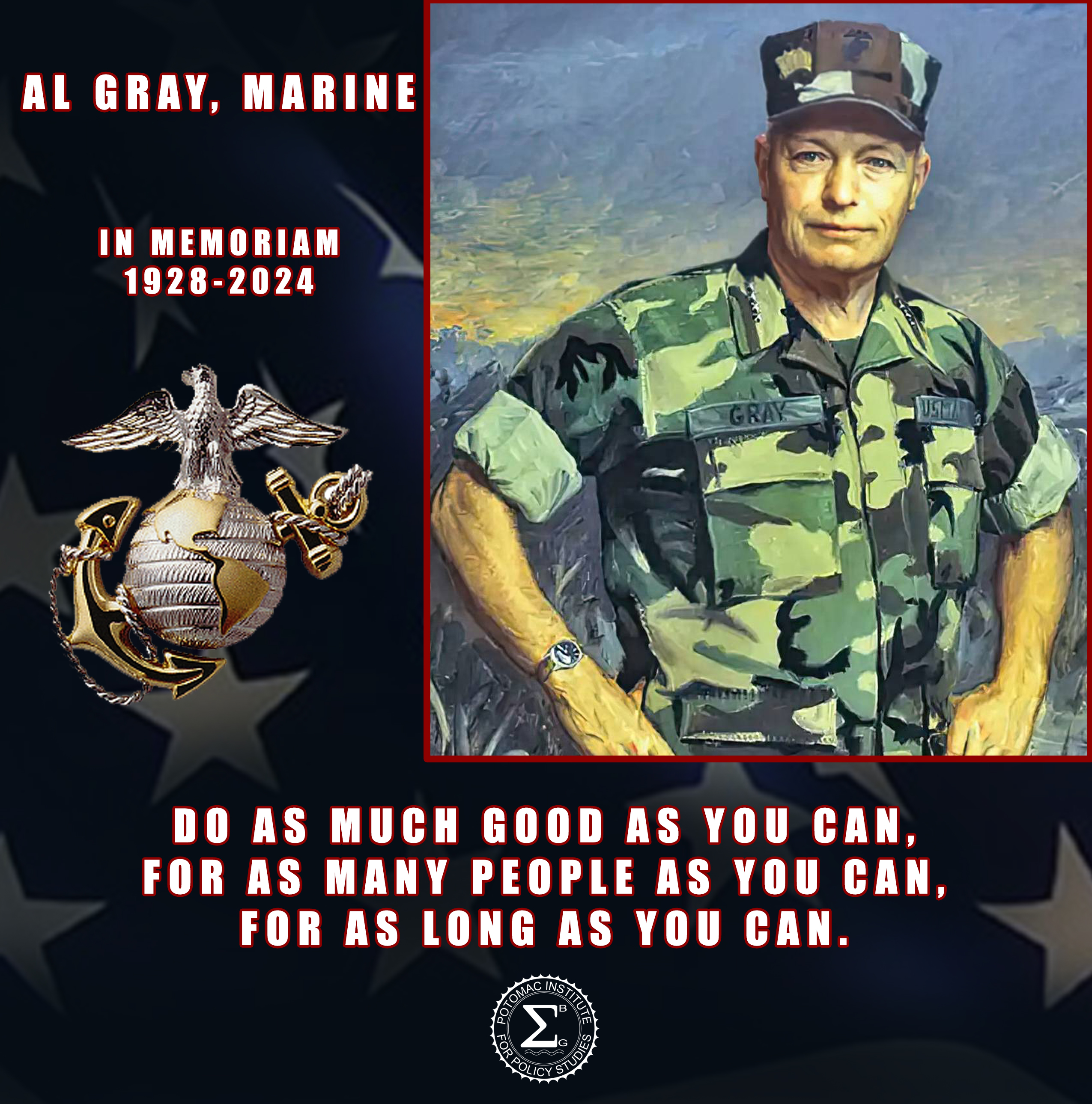

General Alfred M. Gray Jr., the 29th Commandant of the Marine Corps, died March 20 at his home in Alexandria, Virginia. He was 95. General Gray was preceded in death by his beloved wife of 39 years, Jan, who passed away January 30, 2020.
Born June 22, 1928, in Point Pleasant Beach, N.J., Gray enlisted in the Marine Corps in 1950 after dropping out of college to fight in Korea, serving as a radio operator with the Amphibious Reconnaissance Platoon, Fleet Marine Force, Pacific.
Over the next 41 years, Gray established a legacy of heroism in combat, deploying eight times to lead Marines in dangerous missions – several of them clandestine. Gray earned the distinction of leading the first independent ground operations by a Marine unit in Vietnam while commanding a composite unit of signals intelligence Marines supported by attached infantry. During his several deployments to Vietnam, Gray pioneered modern signals intelligence collection methods and developed operational employment concepts in which intelligence drove follow-on operations. His lifelong advocacy for such techniques earned him admittance to the National Security Agency’s Hall of Honor in 2008 for lifetime achievements in the area of signals intelligence. His early work and establishment of two units, formed the nucleus of what is known today as the Marine Cryptologic Support Battalion.
Commanding at every operational level from 40-person platoon to 40,000-strong Marine Amphibious Force, General Gray reached the pinnacle of Marine Corps leadership when Navy Secretary James Webb selected him to serve as the 29th Commandant of the Marine Corps.
While Commandant of the Marine Corps, General Gray established an unrivaled reputation as a champion of academics and professional education. He federated five of the Corps’ formal schools for officers and senior enlisted leaders under the umbrella command of a new Marine Corps University. Hundreds of Marine leaders earn accredited degrees through the university each year as they complete courses of study for promotion and advancement. For Marines of all ranks, Gray implemented the requirement to read at least two books each year from a list he hand-selected. The Commandant’s Reading List remains a fixture of Marine Corps professional development.
Gray also led the Marine Corps through the adoption of the doctrinal warfighting concept that serves as the distinguishing institutional and operational philosophy to this day. The Corps’ embrace of maneuver warfare doctrine earned it numerous battlefield successes from the 1980s through the modern day. Maneuver warfare continues to be studied not just by U.S. Marines, but by foreign militaries and even civilian business schools around the world. Maneuver warfare emphasizes adaptability, decisiveness, and initiative based on common operational understanding.
Throughout his career, Gray’s experience as a junior Marine and a noncommissioned officer anchored his leadership philosophy. In an address to a graduating U.S. Naval Academy class, he advised the newly commissioning officers, "If you come and join my Marines, I want you to know that your 'number one' job is to take care of the men and women you are privileged to lead."
Gray stated in interviews that his best day in the Marine Corps was the day he promoted to corporal and joined the ranks of noncommissioned officers.
"I think as excited as I ever was as a young Marine ... my proudest day probably was when I got to put corporal on my return address on the envelope [home]. That was a very, very good day."
Gray left his mark in other ways as well. When visitors to the Pentagon observe the portraits of the Corps’ Commandants hanging in the Marine Corps hallway, the tidy row of officers bedecked in Marine Corps Dress Blues and gleaming medals is abruptly disrupted by the face of General Gray smiling back at them as he stands proudly in his Camouflage Utility Uniform. As was his reputation, Gray sought to deliver an enduring message. He adamantly instructed all Marines that “every Marine is, first and foremost, a rifleman. All other conditions are secondary.”
This warrior mindset manifested itself in the areas of training and combat readiness as well. Gray directed changes to Marines’ readiness to fight “in any clime or place,” as the service’s hymn reads. Marine formations trained to conduct large-scale maneuvers in desert and cold-weather environments, as unit leaders implemented the tenets of maneuver warfare. This transformation in the aftermath of the Vietnam War-era included the development of a maritime special operations capability, emphasis on the education of leaders, establishment of the Marine Corps University, and development of a long-range desert operations capability.
From their first date in September of 1969, General Gray and his wife Jan were separable only by fidelity to Corps and duty. After a brief engagement, then-Major General Gray and Jan married on July 27, 1980, in Burlington, Vermont. Throughout their marriage of nearly 40 years, Mrs. Gray gave her time and efforts unselfishly to the Marine Corps. She was best known for her dedication to the Navy-Marine Corps Relief Society, the Marine Corps Scholarship Program, the Navy Wifeline Program, the Marine Corps Toys for Tots Program, and the families of casualties from the Beirut Bombing. In 1985, she was lauded with the Marine Corps League Distinguished Service Award. In 1991, the Department of the Navy bestowed on her its Distinguished Public Service Award, recognizing her years of dedication to the men, women and families of the Department of the Navy.
After his military retirement, General Gray served as board chairman and CEO for several public and private companies and was a consultant for several organizations in national and international industry and government. He served on the Defense Science Board; Defense Special Operations Advisory Group; National Security Agency Science Advisory Board; National Reconnaissance Office Gold Team; Defense Operations Support Office Advisory Team; and as director of the Advanced Concept Demonstration Technology for Combat in the Littorals. General Gray was also chairman emeritus of the Injured Marine Semper Fi Fund and America Fund, which help take care of wounded veterans and their families. In addition, he served as chancellor of the Marine Military Academy and chairman of the U.S. Marine Youth Foundation, Chairman of the Board of Directors of the Potomac Institute for Policy Studies, and the Chairman of the Board of the Norwich University Advanced Research Institute.
A public viewing for General Gray will be held from 1400-1600 and 1800-2000, April 7, 2024 at Demaine Funeral Home, 520 S. Washington St, Alexandria, Virginia 22314, 703-549-0074. There will be an open-to-the-public Full Honors Funeral Ceremony in the National Capital Region at a location and time to be determined. Burial services at Arlington National Cemetery will follow the funeral ceremony. In lieu of flowers, General and Mrs. Gray wish for donations to any of the following charitable organizations:
- Injured Marine Semper Fi Fund
- Marine Corps Law Enforcement Foundation
- Marine Youth Fitness Foundation
- Marine Corps University Foundation
- Marine Corps Heritage Foundation
- Marine Corps Scholarship Foundation
- Hope for the Warriors
- Toys For Tots
- Carolina Museum of the Marine
- Marine Corps Association and Foundation
- Navy and Marine Corps Relief Society
-30-
See official Obituary here

 Brian Shirley, Member of the Board of Regents, Potomac Institute for Policy Studies
Brian Shirley, Member of the Board of Regents, Potomac Institute for Policy Studies
INTRODUCTION
Recent events starkly highlighted the importance of semi- conductors to the US economy and the fragility of the US semiconductor supply chain. These shortages were esti- mated to have cost over a full percentage point of 2021 US GDP,1 prompting Congress to pass the 2022 CHIPS and Science Act to level the playing field for onshore semicon- ductor manufacturing after decades of decline.
However, unrelated tax code changes are threatening to unravel any benefit from the CHIPS Act. New 2022 regula- tions that disallow the same-year expensing of investments in research and development (R&D) have perversely made the already-uncompetitive US tax code even more puni- tive to innovation. These disincentives to R&D risk harming US competitiveness across all high-tech fields, including those sectors where the US currently leads.
Continue With full Paper Here.

